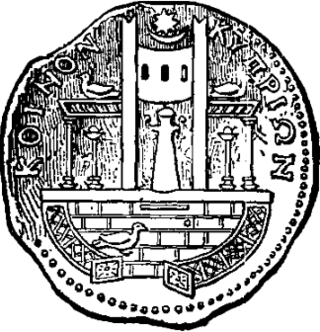A commonwealth is a traditional English term for a political community founded for the common good. The noun "commonwealth", meaning "public welfare, general good or advantage", dates from the 15th century. Originally a phrase, it comes from the old meaning of "wealth", which is "well-being", and is itself a loose translation of the Latin res publica. The term literally meant "common well-being". In the 17th century, the definition of "commonwealth" expanded from its original sense of "public welfare" or "commonweal" to mean "a state in which the supreme power is vested in the people; a republic or democratic state".
A republic is a form of government.
A republic, based on the Latin phrase res publica, is a state in which political power rests with the public and their representatives—in contrast to a monarchy.
Forum or The Forum may refer to:
PL, P.L., Pl, or .pl may refer to:
Res publica is a Latin phrase, loosely meaning 'public affair'. It is the root of the word 'republic', and the word 'commonwealth' has traditionally been used as a synonym for it; however, translations vary widely according to the context. 'Res' is a nominative singular Latin noun for a substantive or concrete thing—as opposed to 'spes', which means something unreal or ethereal—and 'publica' is an attributive adjective meaning 'of or pertaining to the public, people'. Hence a literal translation is, 'the public thing, affair' or 'the people's thing, affair'. m. The latin word res publica was incompatible with the idea of absolute power by any individual or group over the body of citizens. The most essential characteristic of a res publica was liberty (libertas), which meant freedom from the arbitrary control of another and the absence of a monarchical domination over the body politic, that was analogous to the absolute power of a master over a slave.

Optimates and populares are labels applied to politicians, political groups, traditions, strategies, or ideologies in the late Roman Republic. There is "heated academic discussion" as to whether Romans would have recognised an ideological content or political split in the label.

Rzeczpospolita is the official name of Poland and a traditional name for some of its predecessor states. It is a compound of the terms rzecz "thing, matter" and pospolita "common", a calque of Latin rés pública, i.e. republic, in English also rendered as commonwealth (historic) and republic (current).

De re publica is a dialogue on Roman politics by Cicero, written in six books between 54 and 51 BC. The work does not survive in a complete state, and large parts are missing. The surviving sections derive from excerpts preserved in later works and from an incomplete palimpsest uncovered in 1819. Cicero uses the work to explain Roman constitutional theory. Written in imitation of Plato's Republic, it takes the form of a Socratic dialogue in which Scipio Aemilianus takes the role of a wise old man.
Amicus is Latin for 'friend' or 'comrade'. The word may refer to:

In medieval and early modern Western political thought, the respublica or res publica Christiana refers to the international community of Christian peoples and states. As a Latin phrase, res publica Christiana combines Christianity with the originally Roman idea of the res publica to describe this community and its well-being. A single English word with somewhat comparable meaning is Christendom; it is also translated as "the Christian Commonwealth".
Public affairs may refer to:

Andrés Velasco Brañes is a Chilean economist and professor who served as Minister of Finance in the first government of President Michelle Bachelet from March 2006 to March 2010. He is currently the Dean of the School of Public Policy at the London School of Economics.
In ancient Rome, res divinae, singular res divina, were the laws that pertained to the religious duties of the state and its officials. Roman law was divided into the res divina and res publica, the divine and public or political spheres, the latter phrase being the origin of the English word "republic." Res divina also means, as a technical term, ritual sacrifice.

Koinon, meaning "common thing", in the sense of "public", had many applications, some societal, some governmental. An abstract noun formed from the neuter of the adjective, koinos, "common", the koinon could mean any sort of organization. It had more than one meaning in the governmental sense.

The Life of the Mind was the final work of Hannah Arendt (1906–1975), and was unfinished at the time of her death. Designed to be in three parts, only the first two had been completed and the first page of the third part was in her typewriter the evening of the day she suddenly died. The unfinished work was edited by her friend, author Mary McCarthy, and published in two volumes in 1977 and 1978.
This page is based on this
Wikipedia article Text is available under the
CC BY-SA 4.0 license; additional terms may apply.
Images, videos and audio are available under their respective licenses.






